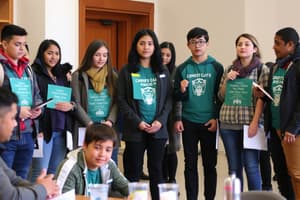Podcast
Questions and Answers
What is the primary aim of the National Service Training Program (NSTP) law?
What is the primary aim of the National Service Training Program (NSTP) law?
- To increase sports participation in schools
- To enhance civic consciousness and defense preparedness (correct)
- To improve physical fitness levels among students
- To reduce tuition fees for students
Which component of the NSTP is focused on community service and development?
Which component of the NSTP is focused on community service and development?
- Literacy Training Service (LTS)
- National Defense Course
- Civic Welfare Training Service (CWTS) (correct)
- Reserve Officers’ Training Corps (ROTC)
Since what academic year has the NSTP been implemented in educational institutions?
Since what academic year has the NSTP been implemented in educational institutions?
- 2000-2001
- 1999-2000
- 2005-2006
- 2002-2003 (correct)
What is one of the primary roles of central offices in relation to the NSRC?
What is one of the primary roles of central offices in relation to the NSRC?
Which of the following is NOT a responsibility of the regional offices?
Which of the following is NOT a responsibility of the regional offices?
For students who cannot complete the NSTP during the regular semester, what alternative is available?
For students who cannot complete the NSTP during the regular semester, what alternative is available?
What are the training hours required per semester for NSTP components?
What are the training hours required per semester for NSTP components?
How are NSRC members expected to respond during disasters or emergencies?
How are NSRC members expected to respond during disasters or emergencies?
What must male students who have taken only one semester of ROTC do to qualify for graduation?
What must male students who have taken only one semester of ROTC do to qualify for graduation?
What is the aim of the Civic Welfare Training Service (CWTS) within the NSTP?
What is the aim of the Civic Welfare Training Service (CWTS) within the NSTP?
Which entity is primarily responsible for the administration and utilization of NSRC members?
Which entity is primarily responsible for the administration and utilization of NSRC members?
What happens to a student who has completed all academic requirements except for ROTC?
What happens to a student who has completed all academic requirements except for ROTC?
Which of the following does the National Service Reserve Corps (NSRC) primarily assist with?
Which of the following does the National Service Reserve Corps (NSRC) primarily assist with?
What is NOT required for a student to qualify for enlistment in the AFP reserve force?
What is NOT required for a student to qualify for enlistment in the AFP reserve force?
Which agency is responsible for supervising the different NSTP components in schools?
Which agency is responsible for supervising the different NSTP components in schools?
Which of the following is NOT an incentive provided to students taking NSTP?
Which of the following is NOT an incentive provided to students taking NSTP?
What structure does the National Service Reserve Corps (NSRC) operate under?
What structure does the National Service Reserve Corps (NSRC) operate under?
How does the state primarily utilize the members of the NSRC?
How does the state primarily utilize the members of the NSRC?
Which NSTP component is guaranteed to be offered by state universities and colleges?
Which NSTP component is guaranteed to be offered by state universities and colleges?
What should be included in the secretariat for NSRC at all levels?
What should be included in the secretariat for NSRC at all levels?
Which of the following organizations does NOT monitor the implementation of the NSTP?
Which of the following organizations does NOT monitor the implementation of the NSTP?
What is the primary focus of the Civil Welfare Training Service (CWTS) component of NSTP?
What is the primary focus of the Civil Welfare Training Service (CWTS) component of NSTP?
Flashcards are hidden until you start studying
Study Notes
National Service Training Program (NSTP) Overview
- Republic Act 9163 establishes the NSTP to enhance civic consciousness and defense preparedness.
- The program is targeted towards all incoming freshman students in baccalaureate and technical-vocational courses.
Program Components
- Reserve Officers’ Training Corps (ROTC): Military training component focused on discipline and leadership.
- Literacy Training Service (LTS): Aims to improve literacy skills in communities.
- Civic Welfare Training Service (CWTS): Engages students in community service and welfare activities.
Implementation Details
- NSTP began implementation in the academic year 2002-2003.
- Each NSTP component lasts for two semesters, earning three academic units per semester with 54 to 90 training hours.
Enrollment and Participation
- All incoming freshmen, male and female, are required to take NSTP.
- If unable to participate during the regular semester, students may enroll in a one-summer NSTP program if approved by DND, CHED, and TESDA.
- Students whose preferred NSTP component is unavailable can cross enroll at other institutions.
Previously Enrolled Students
- Male students enrolled but not yet completed any previous ROTC courses fall under NSTP coverage.
- Students fulfilling all academic requirements except ROTC are allowed to graduate.
- Completion of two semesters of E-ROTC/NSTP meets NSTP requirements.
National Service Reserve Corps (NSRC)
- Graduates of non-ROTC components become members of the NSRC and may support literacy and welfare activities.
- Membership in the AFP reserve force requires completion of two semesters of basic ROTC.
Fees and Incentives
- No fees are charged for any NSTP component.
- Incentives for students include:
- Programs for ROTC students from DND.
- Health and accident insurance.
- Special scholarship opportunities.
Oversight and Partnership
- School authorities manage academic and administrative supervision of NSTP.
- Monitoring agencies include CHED regional offices, TESDA offices, and the DND-AFP.
Availability
- All higher education institutions provide at least one NSTP component; state universities and colleges must offer ROTC and at least one additional component.
Organization of the NSRC
- The NSRC operates under the National Disaster Coordinating Council (NDCC).
- It has a structured organization at various governmental levels, paralleling the Disaster Coordinating Council.
Responsibilities of Governing Bodies
- The NDCC oversees the administration, training, and support of NSRC members.
- CHED/TESDA’s central offices handle organization, member registration, and data management for the NSRC.
CWTS Course Description
- CWTS aims to empower youth to enhance community welfare and quality of life through projects that improve health, education, safety, and social services.
- Students are encouraged to focus on community projects that address local needs and promote socio-economic development.
Studying That Suits You
Use AI to generate personalized quizzes and flashcards to suit your learning preferences.




